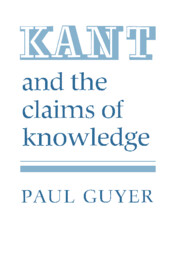Book contents
- Frontmatter
- Contents
- Acknowledgments
- Note on sources
- Introduction
- Part I Kant's early view
- Part II The transcendental deduction from 1781 to 1787
- Part III The principles of empirical knowledge
- Part IV The refutation of idealism
- 12 The problem, project, and premise of the refutation
- 13 The central arguments of the refutation
- 14 The metaphysics of the refutation
- Part V Transcendental idealism
- Afterword
- Notes
- Index of passages cited
- General index
14 - The metaphysics of the refutation
Published online by Cambridge University Press: 09 March 2010
- Frontmatter
- Contents
- Acknowledgments
- Note on sources
- Introduction
- Part I Kant's early view
- Part II The transcendental deduction from 1781 to 1787
- Part III The principles of empirical knowledge
- Part IV The refutation of idealism
- 12 The problem, project, and premise of the refutation
- 13 The central arguments of the refutation
- 14 The metaphysics of the refutation
- Part V Transcendental idealism
- Afterword
- Notes
- Index of passages cited
- General index
Summary
Kant's efforts in 1788 and the following years thus produced at least the outline of one sustained argument from epistemological considerations alone for the conclusion that we must know enduring objects in space in order to determine the succession of our own representations. On this argument these objects must be regarded as ontologically independent of these representations and the empirical self represented by them, because they are enduring but also agents of change which must be conceived of as independent of the self upon which they act.
Completing the refutation?
Kant's notes, however, also contain a further attempt to argue for such an ontological conclusion from patently metaphysical premises. This is an attempt to offer a general explanation of our possession of the spatial form of representation itself by means of objects independent of ourselves, rather than an argument that particular judgments about the subjective succession of experiences can be justified only by the correlation of such experiences with external objects. Such a metaphysical explanation is in profound tension with the strictures on speculation characteristic of Kant's more critical moments. Fortunately, such an additional step also seems to be required to supplement only the most schematic version of Kant's first tactic for the refutation, which carried the argument from time to the spatial form of the manifold of intuition but not beyond. A separate inference from spatiality to ontological independence would be otiose where the primary inference is from succession in time directly to enduring objects, for in any argument of that general form, spatiality is introduced only to represent the already established independence of such objects. Thus, the problems which infect this separate metaphysical stage of one form of Kant's refutation need not destroy the whole.
- Type
- Chapter
- Information
- Kant and the Claims of Knowledge , pp. 317 - 330Publisher: Cambridge University PressPrint publication year: 1987



